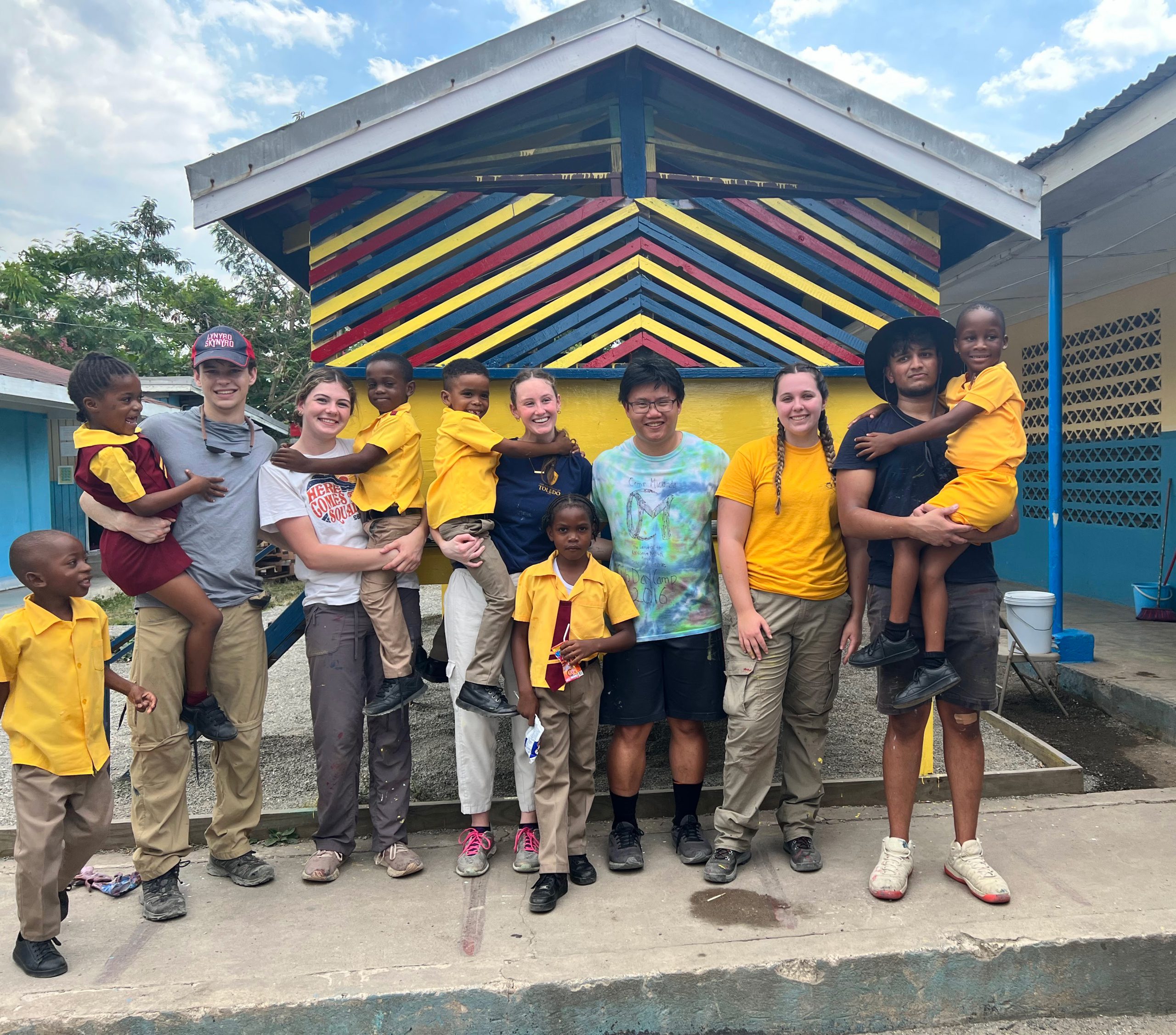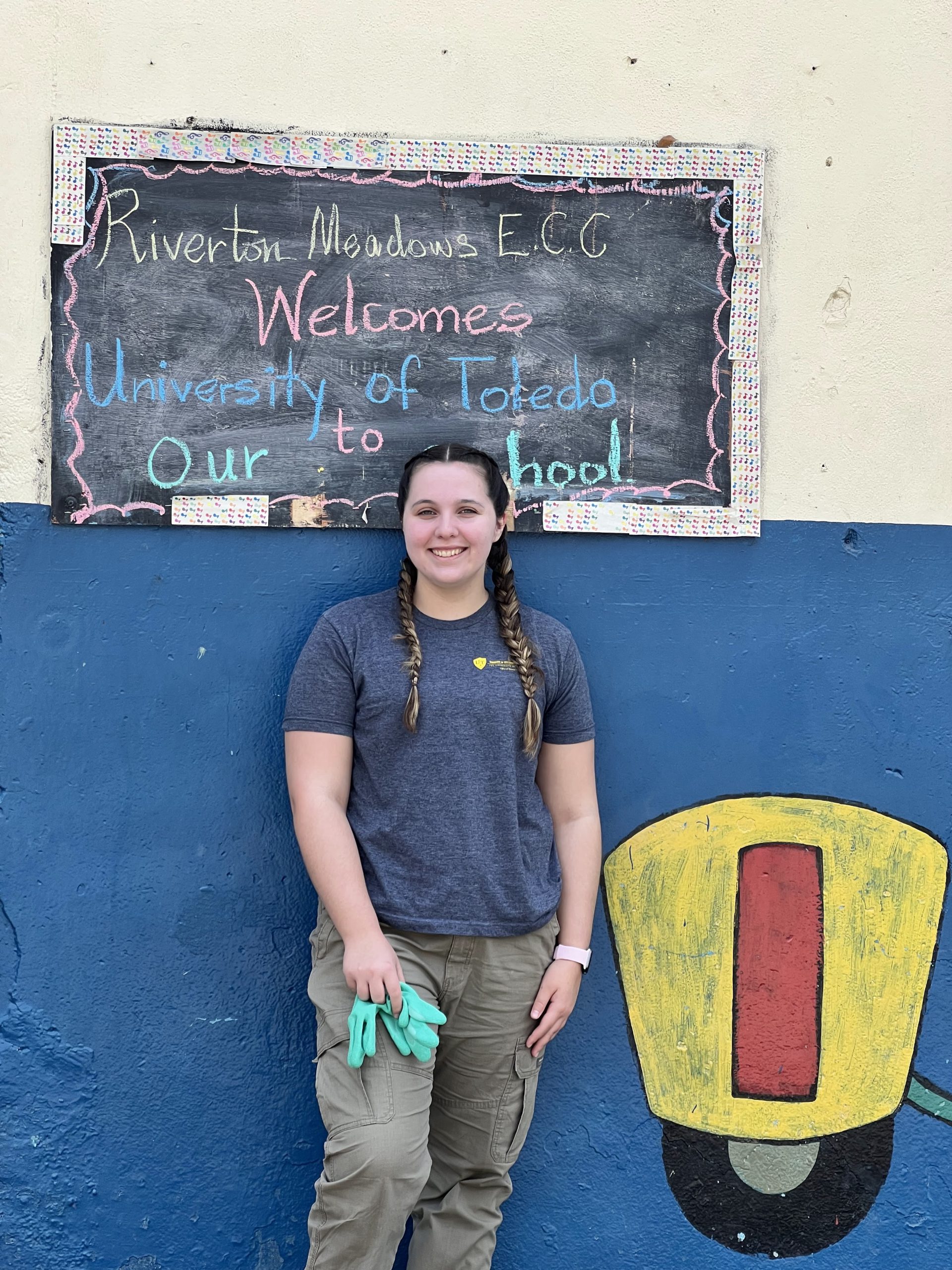Amidst the trash heaps and toiling strife of the poor who earn their living from them, Tatum Pullins, an exercise science major and student in the Jesup Scott Honors College at UToledo, was overrun with emotion.
Her shock at seeing dirty toddlers playing within sight of the town dump, though, was soon replaced by grief for the grinding daily realities of the residents in Riverton City, Jamaica.

CELEBRATING SUCCESS: UToledo recognizes the Class of 2023 with a series of stories featuring students receiving their degrees at spring commencement.
Pullins had participated in a service learning trip over spring break to help the residents of Riverton City develop novel revenue streams to replace scavenging in the dump. The trip was facilitated by International Samaritan, a global nonprofit that aims to improve the quality of life for those living in garbage dump communities.
Yet, by the end of her week in Jamaica, Pullins’ despair had dissolved into clarity and purpose: She would dedicate her career as a physician assistant to healing the forgotten and overlooked closer to home.
Considering the harsh conditions faced by many of these populations, this mission can often seem insurmountable. The situation encountered by Pullins and her fellow Honors students was no rosier.
Because of the prevalence of white trash bags in Jamaica, Pullins said, “the residents, when working in the dump, wear all black clothing in 90-to-100-degree weather to try and visually differentiate themselves from the trash so that nobody gets hurt when the dump trucks come to unload more garbage.”
Despite the dangers inherent in the work, the reliance by the community on scrap metal and other salvageable materials scattered among the refuse is tragically prevalent.
“Some parents are thankful that they are able to keep their children out of the trash dump by being able to scavenge enough themselves,” Pullins said. “But sometimes they have to start children collecting materials in the dump by the time they’re able to walk.”

Over spring break, Tatum Pullins, third from right, who received a bachelor’s degree in exercise science UToledo in May, participated in a Jesup Scott Honors College service learning trip to Riverton City, Jamaica.
To provide the community a safer source of income, the visiting group of Honors students and representatives from International Samaritan drafted blueprints for a series of “found art” jewelry and collage projects that residents can make and sell online to customers around the world. The materials used for the pieces, elements that could be sourced locally and safely, were identified by Pullins and her fellow Honors students through field reports they conducted during the trip.
Pullins was joined on the trip by bioengineering major Zoe Bauman, history major David Heuring, pre-business major Connor Koop, biology major Hemanth Yellagoud, speech-language pathology major Brooke Taylor and JSHC Associate Professor Dr. Ashley Pryor.
Beyond generating new revenue streams, the group spent their days painting and restoring playground equipment at the nearby elementary school as well as playing with the children.
“The children didn’t know us, of course,” Pullins said, “but as soon as we walked in, they ran up to us and they hugged us and asked, ‘Do you want to come see my playground?’
“At the end of the day, when we finished work on the equipment and we saw the kids playing on it, that was just an amazing feeling.”
While Pullins said she is proud of the impact the trip had on their community, she feels just as strongly about what the group did not do – impose a preconceived notion of development on Riverton City.
“I really like how our approach was very hands-off and ethical, how we arrived there and the community told us what to do to help them,” she said.

After she participated in a Jesup Scott Honors College service learning trip to Riverton City, Jamaica, Tatum Pullins plans to work with underserved communities after she completes a physician assistant graduate program.
The experience reminded Pullins of the importance of feeling seen as well as heard – and at a crucial juncture of her academic career. Mere months away from graduation, though thousands of miles from home, she realized the profound effect she could have as a physician assistant working with underserved communities in her own backyard.
“Sometimes we think that change only happens according to a grand scheme,” she said, “but I recognized there in Jamaica the difference I could make as a compassionate health provider in small, rural communities in Ohio – some of which don’t have any doctors practicing within 40 or 50 miles of them.”
Pullins was primed for the insight after spending months reflecting on the disadvantages encountered by another often overlooked population: first-generation college students. The only member of her own family to ever attend college, she devoted her Honors thesis to compiling a list of campus resources that could hopefully promote equitable access to higher education.
“We are so grateful for the Jesup Scott Honors College’s Experiential Learning Fund that makes it possible for students like Tatum to engage in meaningful study abroad opportunities like our partnership with International Samaritan,” Pryor said.
“I am confident that Tatum will carry this experience with her in her future work as a physician assistant. Her clients and community will be the beneficiaries of her experiences in Riverton City. It is in this way that the benefits of study abroad trips extend well beyond a week’s stay in a host country.”
Now, two months after returning from Jamaica and poised to begin applying to physician assistant graduate programs, the emotion Pullins feels most pointedly is gratitude. After all, this life-changing opportunity almost passed her by.
“This was actually a trip that I wanted to go on as a first-year student,” she said, “but I couldn’t afford to at the time – and then the pandemic prevented travel for a few years. So, when Dr. Pryor sent out the e-mail earlier this year announcing the trip, I was the first one to call her.
“Between the constant advocacy by Dr. Pryor to make this trip happen,” Pullins added, “and the trip costs being nearly covered by the Honors College as well as the Center for International Studies and Programs, I am so thankful to have had this opportunity.”